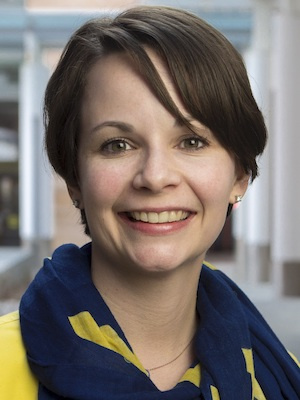Integrating into the BBA Program as a Transfer Student

As we near the end of August, campus is really coming to life with signs of fall upon us.
Students have returned to campus, classes are beginning, and I can hear the Michigan Marching Band practicing in the distance at Elbel field when walking out of the Ross buildings. There is so much going on at Michigan Ross, including BBA student events like Meet the Clubs, and across campus with Welcome to Michigan week activities underway. It’s one of my favorite times of the year.
As we begin fall semester, I want to focus this blog post on our incoming transfer students and what they can expect when integrating into the Michigan Ross BBA Program that first semester. Here are a few items that I think are important to share with you.
Everyone is on equal footing
The core Michigan Ross BBA curriculum does not begin until sophomore year. The first year of the program is focused on the transition to college coursework, which mainly encompassess students’ College of Literature, Sciences, and the Arts distribution credit (to understand the LSA distribution requirements, click here). For transfer students, if you were enrolled in another U-M unit on campus, you will likely have fulfilled some of this distribution coursework already. For transfer students enrolling from another institution, the liberal arts credits you transfer from your previous institution will be counted toward the LSA distribution coursework. To understand how coursework at institutions outside of U-M transfer in, please visit the Transfer Credit Equivalency database.
Please note that students who started their first year within the Michigan Ross BBA Program will have already taken the BA 100 Signature Learning Experience and Business Communication 250 courses. (See requirements by year here.) For incoming transfer students, you will enroll in BCOM 250 your first year in the program, and take a different version of BA 100, known as BA 102 (I’ll talk about that later in this blog). So everyone is on equal footing when they begin the BBA core curriculum.
BBA sections
Speaking of the BBA curriculum, it is important to note that your core curriculum has a cohort-based model of instruction. We call these cohorts “sections”. Each BBA student is placed in a section the year they begin the core curriculum. Each time you enroll in a core curriculum course, it will be with the students in your same section. Thus, during your first semester within the BBA program, the peers in your Financial Accounting course are the same as those in your Business Analytics and Statistics course. As you may know, the Michigan Ross BBA Program has a focus on group and project-based learning, thus the section model allows us to foster a collaborative environment.
What is BA 102?
In addition to creating a collaborative environment within your section, we want our incoming transfer students to share an experience that provides a successful transition to the Ross BBA Program. That course is known as Business Foundations (BA 102), which is a one credit course required for students who enter the BBA program as a transfer student. This course begins with a session just prior to the start of classes and has additional meetings during the early fall term to complete this requirement. BA 102 is a wonderful opportunity for students to learn more about Michigan Ross and areas of business. It is taught by Norm Bishara, associate dean for Undergraduate Programs at Ross, and David Wooten, associate dean for our One-Year Master’s Programs. That’s right, Michigan Ross believes this class is so important we have two faculty in our Dean’s Office devoting their time to ensure that our incoming transfer students understand and feel welcome within the BBA program. It is a course that sets the tone for your BBA experience, and one in which you will engage with students who are on a similar journey as you are.
I hope this provides you with an overview of how you will integrate into the Michigan Ross BBA Program as a transfer student and provides insight into how all students begin the core curriculum at the same time. For more information on the BBA curriculum and academics, please check out the Michigan Ross website.





